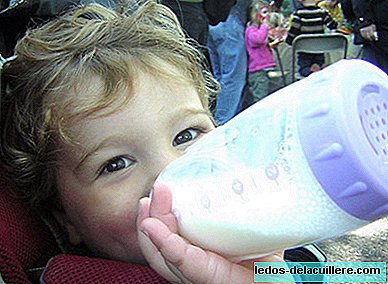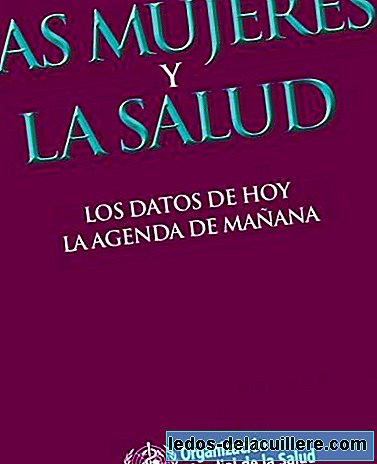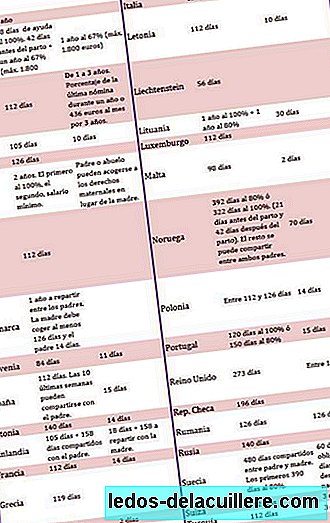
Six years ago we commented on Babies and more a report from the OCU in which they explained that growth milks were not necessary for children. Three years later the German Ministry of Food wanted to study them too, writing a report that came to say the same.
Time has passed, the brands have modified their formulas and their packaging, they are still called growing milk, with drawings of children or pets next to meters, as if by taking it the children's centimeters increased, or type 3 milk, as if it was the forced continuation of continuation milks and the OCU has re-analyzed them To reach the same conclusion: still not necessary.
Milk is a very complete and important food when children are young. Without going any further, it is the recommended food during the first two years of a baby's life, and in this case I refer to breast milk, being a year when it becomes a food more than the diet and not the main one. From that moment, from the year, It is recommended that you continue drinking milk, maternal if it can be and other milk if it is not possible.
Another milk could be the one of continuation, the one of growth or the milk of cow. The amount recommended for children is the same as that recommended for anyone: two servings of dairy, which is equivalent to two glasses of milk or four yogurts. That is, if a child drinks a glass of milk in the morning, at noon he eats a yogurt and then at night he drinks some cheese and half a glass of milk, he has already taken what is recommended. As you can see, many children take more than that and as a result they run the risk of not eating other foods that are the same or more important.
What the growth milks provide
Taking into account that at 12 months babies can already drink the milk they prefer, because it is indistinct, OCU has reviewed the labels of 15 of the leading brands of growing milk and based on them he comments his conclusions. At the energy level it provides the same as the start and continuation milks and similar to what cow's milk provides.
Cow's milk has no sugar beyond lactose, which is naturally present in it. In 9 of the 15 brands that have looked, they have observed that in addition to lactose they have added sucrose, glucose syrups, fructose or honey. In addition, more than half carry vanilla aroma. Being all this excessive and not recommended.
The protein content is lower than that of cow's milk, something correct, since children also do not need too much protein, but that it can be remedied for those who drink whole cow's milk taking the recommended one and not more (that is , do not do what many children who get to drink up to a liter of milk a day).
At fat level they have an amount similar to cow's milk, but with a different lipid profile. They contain less saturated fat and more essential fatty acids, being more similar in this regard to breast milk than cow's milk. The problem is that they do not contribute anything new because they are fats that are already found in olive oil, in cereals, eggs or fish, among other foods.
Many have less calcium than cow's milk, some reaching half, although they have more vitamins than cow's milk, since they are enriched with every imaginable. Now, calcium doesn't have to be a problem, because children need calcium but you don't have to go crazy either, but yes it can be an excess of vitamins. Given that from the year a child already eats a lot of things and very varied, normally, adding vitamins to the milk that he is already receiving from other foods is unnecessary and, in some cases, as I say, it can be negative.
What growth milks cost
So far, as you can see, there is not much reason to opt for growing milk, because it is another food in the child's diet. If it still cost the same as cow's milk, a family might consider buying it, but it is worth more than double and that extra cost is not reflected in better child health or growth. The average price of whole milk is € 0.70 / liter, that of growing milks is € 2.2 / liter, being cheaper than those already prepared, which cost about € 1.60 / liter.
A balanced diet with healthy foods
So if what some parents want is that their child is healthy and lacks what they have to do is offer you a balanced diet based on healthy foods: milk, vegetables, whole grains, nuts, meat, fish, eggs, fruit and drinking water. All this in the right proportions means that a child does not lack anything and, therefore, does not need any fortified food that costs more than double the money.
Only using such a milk would be considered if a child had a lot of problems with food, if you really ate a little varied or not tolerate some foods and were interested that the milk you drink could give you some of what you might lack for not eating other things. If this is not the case, we are left with the final recommendation of the OCU: "Unless the doctor decides otherwise, opt for normal cow's milk, of good quality and cheaper."












